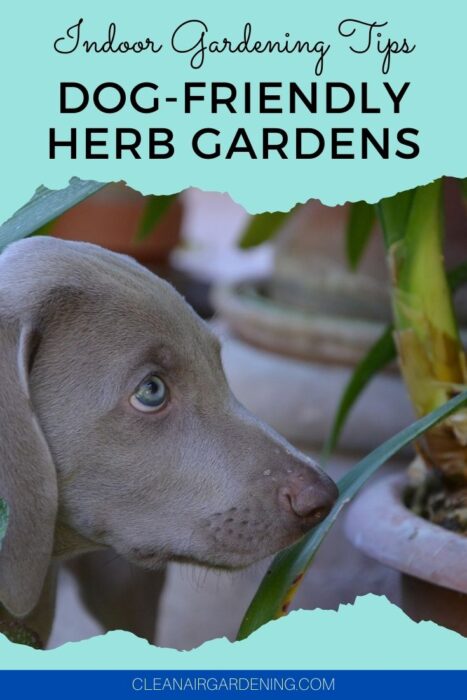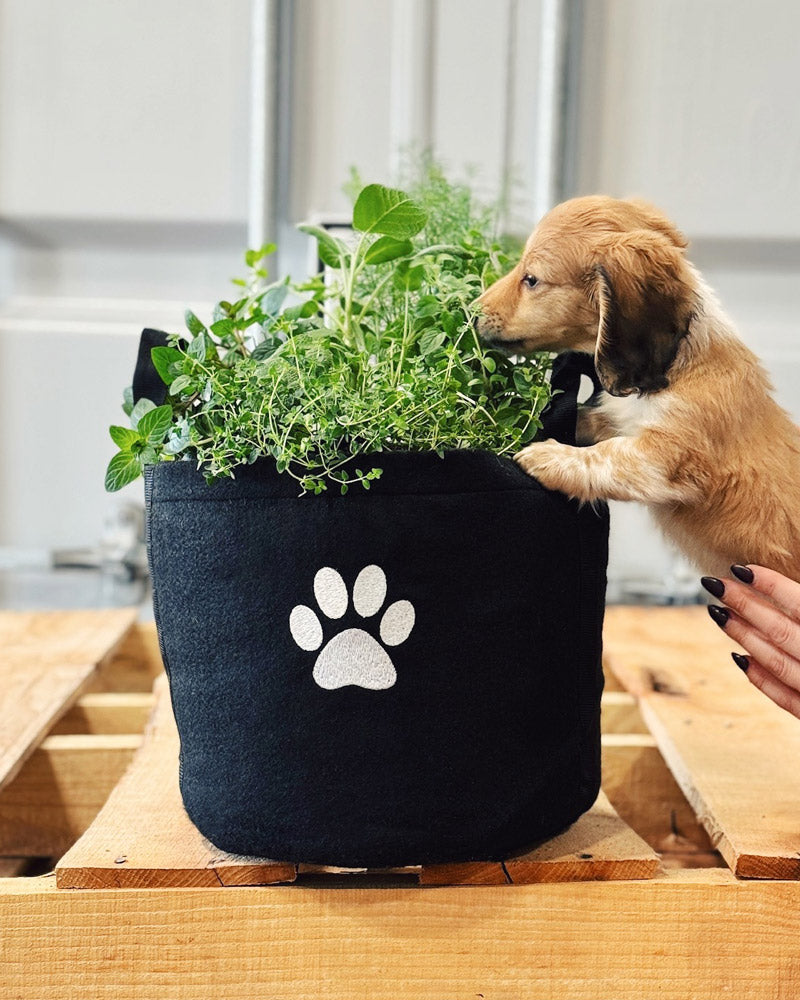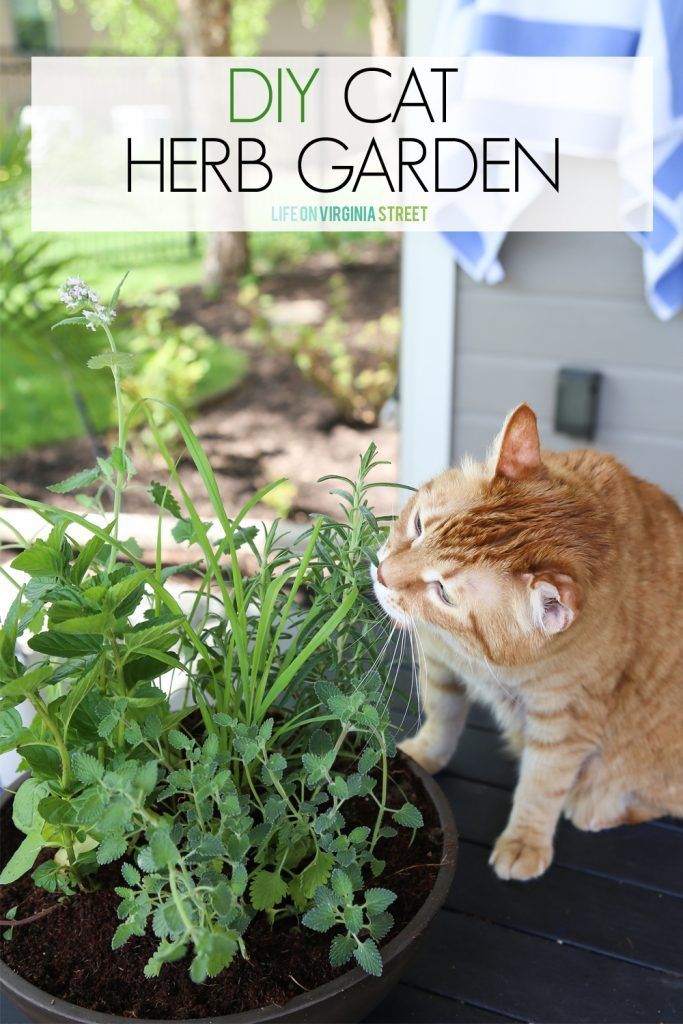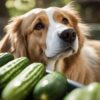Key Takeaways
Many herbs like basil, parsley, and thyme can be grown indoors year-round, making them perfect for pet owners.
Herbs such as rosemary, catnip, and chamomile are safe and beneficial for pets.
Indoor herb gardens offer numerous benefits including fresh ingredients for cooking and natural remedies for pets.
Proper care, including sufficient sunlight and water, is essential for maintaining a thriving indoor herb garden.
Despite initial setup costs, indoor herb gardens can be cost-effective in the long run.
Best Herbs to Grow Indoors Around Pets
Growing herbs indoors is a fantastic way to ensure you have fresh ingredients at your fingertips. It’s also a great way to provide natural remedies for your pets. Let’s explore the best herbs to grow indoors that are safe for your furry friends.
“Dog-Friendly Herb Garden Indoors …” from www.cleanairgardening.com and used with no modifications.
“DIY Dog Friendly Herb Garden – Kol’s Notes” from kolchakpuggle.com and used with no modifications.
Pet-Friendly Herbs
When selecting herbs to grow indoors, it’s crucial to choose varieties that are safe for pets. Some common pet-friendly herbs include:
Catnip: A favorite among cats, catnip can provide a natural source of entertainment and relaxation for your feline friends.
Chamomile: Known for its calming properties, chamomile can help soothe anxious pets.
Parsley: This herb is not only safe for pets but also packed with nutrients that can benefit their overall health.
Thyme: Thyme is safe for pets and can be used to add flavor to your dishes.
Rosemary: This aromatic herb is safe for pets and can help repel pests naturally.
Benefits of Specific Herbs
Each herb offers unique benefits for both you and your pets. For example, catnip is known to stimulate playful behavior in cats, while chamomile can be used to make a soothing tea that benefits both humans and pets. Parsley is rich in vitamins A and C, which can support your pet’s immune system.
Besides that, rosemary can be used as a natural flea repellent. Simply crush a few leaves and sprinkle them around your pet’s bedding. Thyme, on the other hand, has antibacterial properties and can be used to make a natural mouthwash for pets.
Is an Indoor Pet Safe Herb Garden Worth It?
Now that we’ve covered some of the best herbs to grow indoors, you might be wondering if it’s worth the effort to set up an indoor herb garden. Let’s weigh the pros and cons.
Pros of Indoor Herb Gardens
Indoor herb gardens offer numerous benefits:
Year-Round Availability: You can have fresh herbs at your disposal throughout the year.
Cost-Effective: Growing your own herbs can save you money in the long run compared to buying them from the store.
Health Benefits: Fresh herbs are packed with nutrients and can improve the flavor of your meals.
Natural Remedies: Many herbs have medicinal properties that can benefit both you and your pets.
Environmental Benefits: Growing herbs indoors reduces the need for transportation and packaging, making it an eco-friendly choice.
Cons of Indoor Herb Gardens
However, there are some challenges to consider:
Initial Setup Cost: While growing herbs can be cost-effective in the long run, the initial setup can be expensive.
Space Requirements: Indoor herb gardens require space, which might be limited in smaller homes or apartments.
Maintenance: Herbs require regular care, including watering, pruning, and ensuring they get enough sunlight.
Despite these challenges, the benefits of having fresh, pet-safe herbs readily available often outweigh the drawbacks.
“Dog Giftable Garden with pet-friendly …” from gardenuity.com and used with no modifications.
Can You Have an Indoor Pet Safe Herb Garden Year-Round?
Absolutely! Growing an indoor herb garden that is safe for pets year-round is not only possible but also highly rewarding. The key lies in understanding the needs of your herbs and providing them with the right conditions throughout the year.
Let’s delve into the specifics of maintaining a thriving indoor herb garden across different seasons. For more details, you can check out this guide on indoor herb gardening.
Indoor Herb Gardening in Different Seasons
Each season presents unique challenges and opportunities for indoor herb gardening. During the winter months, herbs like basil and parsley may require additional light sources, such as grow lights, to compensate for shorter daylight hours. On the other hand, summer offers abundant natural light, but you need to ensure your herbs are not exposed to excessive heat.
In spring and fall, the moderate temperatures and natural light are ideal for most herbs. However, it’s essential to monitor indoor temperatures and humidity levels to ensure your herbs thrive. Moving pots closer to windows during winter and away from direct sunlight in summer can help maintain optimal growing conditions.
Climate Control and Light Requirements
Maintaining a consistent indoor climate is crucial for the health of your herbs. Most herbs prefer temperatures between 60°F and 70°F. Using a thermostat to regulate indoor temperatures can be beneficial. Additionally, maintaining humidity levels around 40-50% can prevent your herbs from drying out.
Light is another critical factor. Herbs need at least six hours of bright, indirect sunlight daily. South-facing windows are ideal, but if natural light is insufficient, consider using LED grow lights. These lights can mimic the spectrum of natural sunlight and support healthy herb growth.
“Cat garden, Indoor cat garden …” from www.pinterest.com and used with no modifications.
How to Maintain a Pet-Friendly Indoor Herb Garden
Maintaining an indoor herb garden requires attention to detail and consistent care. Here are some essential tips to keep your pet-friendly herbs healthy and thriving.
Basic Care and Watering
Proper watering is essential for herb health. Overwatering can lead to root rot, while underwatering can cause herbs to wilt. A good rule of thumb is to water your herbs when the top inch of soil feels dry to the touch. Ensure your pots have drainage holes to prevent water from pooling at the bottom.
Besides that, using a spray bottle to mist your herbs can help maintain humidity levels, especially during dry winter months.
Organic Soil and Fertilization
Using organic soil is crucial for the health of your herbs and the safety of your pets. Organic soil is free from harmful chemicals that could be toxic to pets. Additionally, organic fertilizers, such as compost or worm castings, can provide essential nutrients without the risk of chemical exposure.
Fertilize your herbs every 4-6 weeks during the growing season. Be cautious not to over-fertilize, as this can lead to nutrient imbalances and affect herb health. For example, rosemary is not toxic to dogs or cats, making it a great choice for pet-friendly gardens.
Proper Potting and Drainage
Choosing the right pots and ensuring proper drainage is vital for indoor herb gardening. Clay or ceramic pots are ideal as they allow for better airflow and moisture regulation. Ensure each pot has drainage holes to prevent waterlogging.
Using a saucer under each pot can catch excess water and prevent it from damaging your surfaces. Additionally, placing a layer of gravel or small stones at the bottom of the pot can enhance drainage.
Use pots with drainage holes to prevent waterlogging.
Place a saucer under each pot to catch excess water.
Add a layer of gravel at the bottom of pots for better drainage.
Nontoxic Pest Control and Disease Prevention
Keeping your indoor herb garden free from pests and diseases is crucial, especially since you’ll want to avoid using chemicals that could harm your pets. Here are some nontoxic methods to keep your herbs healthy:
Neem Oil: This natural oil is effective against a variety of pests, including aphids and spider mites. Simply mix a few drops with water and spray on your plants.
Insecticidal Soap: A homemade solution of mild dish soap and water can help control pests. Spray it directly on the affected areas.
Companion Planting: Planting herbs like basil and marigold together can naturally repel pests.
Manual Removal: Regularly inspect your herbs and remove any visible pests by hand.
Healthy Soil: Using organic soil and compost can help prevent diseases by promoting healthy plant growth.
Most importantly, maintaining good air circulation and avoiding overwatering can prevent many common issues like mold and mildew. Regularly prune your herbs to promote airflow and remove any diseased or dead leaves immediately.
Frequently Asked Questions (FAQ)
Which Herbs are Unsafe for Pets?
While many herbs are safe for pets, some can be harmful. Avoid growing these herbs indoors if you have pets:
Garlic: Can cause gastrointestinal upset and damage red blood cells in pets.
Onions: Similar to garlic, onions can be toxic to pets, causing anemia and other health issues.
Chives: These can cause gastrointestinal upset and red blood cell damage in pets.
Oregano: In large quantities, oregano can cause gastrointestinal upset in pets.
Therefore, always ensure you research the safety of any herb before introducing it to your indoor garden.
How Much Light Do Indoor Herbs Need?
Herbs generally require at least six hours of bright, indirect sunlight each day. South-facing windows are ideal, but if natural light is insufficient, consider using LED grow lights. These lights can provide the necessary spectrum of light to support healthy herb growth.
Besides that, regularly rotate your pots to ensure all sides of your plants receive equal light exposure. This will help your herbs grow evenly and prevent them from becoming leggy.
Can I Use Regular Soil for Indoor Herbs?
While you can use regular potting soil for indoor herbs, it’s best to opt for organic soil. Organic soil is free from harmful chemicals and provides a healthier environment for your herbs and pets. Additionally, organic soil tends to have better drainage and nutrient content.
Moreover, adding compost or worm castings to your soil mix can enhance its nutrient profile and support robust herb growth.
Conclusion
Growing an indoor herb garden that is safe for pets is not only possible but also highly rewarding. By selecting pet-friendly herbs, providing the right care, and maintaining a nontoxic environment, you can enjoy fresh herbs year-round. Whether you’re using them to enhance your cooking or as natural remedies for your pets, the benefits are plentiful.








